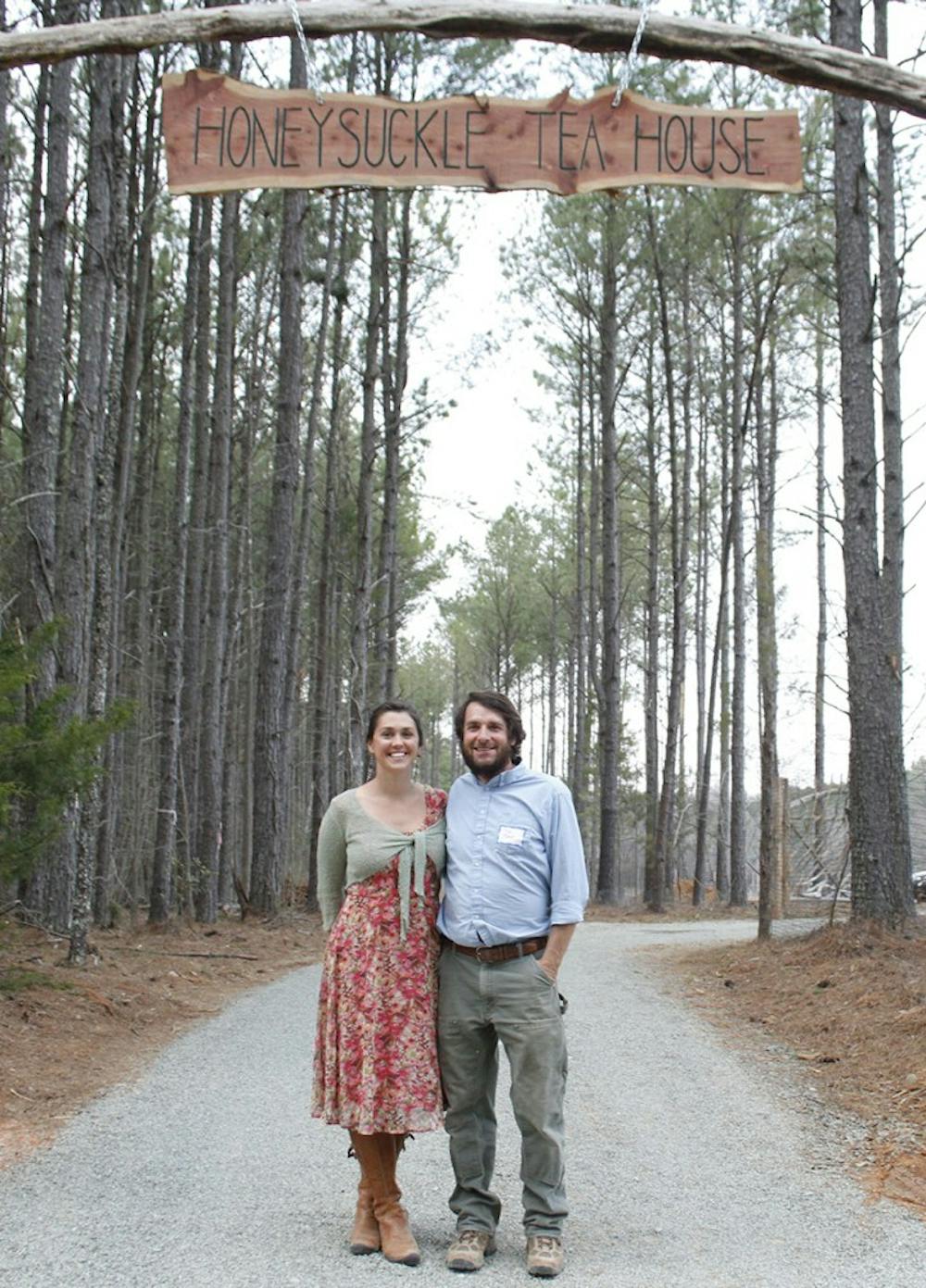Once a month, people who have taken the cooking classes, as well as residents from all over Chapel Hill and Carrboro, gather at the kitchen for a community potluck. Each person brings a dish made from farm-fresh ingredients.
The Institute will soon have another place for people to gather — a tea house. Located at the beginning of the long dirt driveway, the Honeysuckle Tea House the only building on the property that’s visible from the paved Jo Mac Road. It will sell teas, berries and herbs.
“The tea house is going to be kind of an alternative to a coffee shop,” Toben said. “So if you get up in the morning and you want to find a place to do your work. It’ll be a beautiful place to kind of look out. More of a peaceful, bucolic setting than an urban setting.”
The Tea House held a pre-opening celebration Saturday. Guests got a glance at the tea house’s blends, with names like Love Joy, Shelter from the Storm and Peaceful Pleasure.
“We have found a lot of comfort and solace in this land,” Toben said. “We’re trying to offer that to other people as well. It’s a crazy time we’re living in.”
Tim Toben knows about crazy times. He was a businessman for decades before dedicating his life to sustainable farming in Orange County. In 2005 , he invested in Greenbridge Condominiums, an environmentally sustainable, mixed-use space on Rosemary Street in downtown Chapel Hill. The project has been lauded as one of the most environmentally sustainable projects in America. It was the first development in North Carolina to receive gold certification in the Leadership in Energy and Environmental Design (LEED ) standard, a national standard for energy-efficient, environmentally conscious architecture.
It was also the subject of a community-wide controversy. Residents were concerned Greenbridge would further gentrify the Northside neighborhood, a historically black and low-income area. The tension resulted in several protests and two bomb threats.
But it wasn’t the controversy that caused Greenbridge’s demise. By the time the development opened in October 2010, the nation was facing a serious economic recession.
The cost of building such an environmentally-friendly development was enormous. Without the income from selling units, Toben and his business partners ran out of money and the development was foreclosed on in late 2011. By then, its investors owed almost $40 million to the bank and other creditors .
Toben had liquidated his assets and pledged his home and land to the bank and creditors to help pay for his share in the investment. When it failed, he lost everything.
After the fallout, he decided to dedicate his time to expanding Pickards Mountain Eco-Institute, which he and his wife started in 2002.
Toben said he much prefers the life of a farmer to that of a high-rolling businessman.
To get the day's news and headlines in your inbox each morning, sign up for our email newsletters.
“It’s a much simpler life,” he said. “If you’re doing what your soul tells you to do and you’re with your family and friends, then money doesn’t matter.”
Toben said the Institute educates people about sustainable living and the importance of local economy.
“We’re trying to recreate a local economy that can survive even if the global economy falters. Not in a survivalist, end-of-the-world sort of way, but in a way that says, ‘Wouldn’t it be nice if we weren’t so dependent on the mall.’”
Toben said his family is mostly self-sufficient. They eat the food they grow on the farm and homeschool their two school-aged children.
They also generate their own energy. The 100 kilowatt hour solar farm powers everything on the property, as well as the homes of eight of his neighbors.
It may sound like an insular lifestyle, but it’s not, Toben said. Because the Institute’s main purpose is education, dozens of people come in and out of the farm each day.
In two years, the farm has had hundreds of interns and almost 3,000 visitors. The Institute hosts several live-in interns from all around the country for three-month periods as part of its Odyssey Internship Program.
As an intern with the Odyssey program, Emma Robbins , a native of Richmond, Va., does everything from diagramming seed distribution to teaching kids at local schools about gardening to helping out at the Tea House.
“This is one of the best places I’ve ever been,” she said. “It creates a space for people to really question the way that we’re living.”
city@dailytarheel.com



